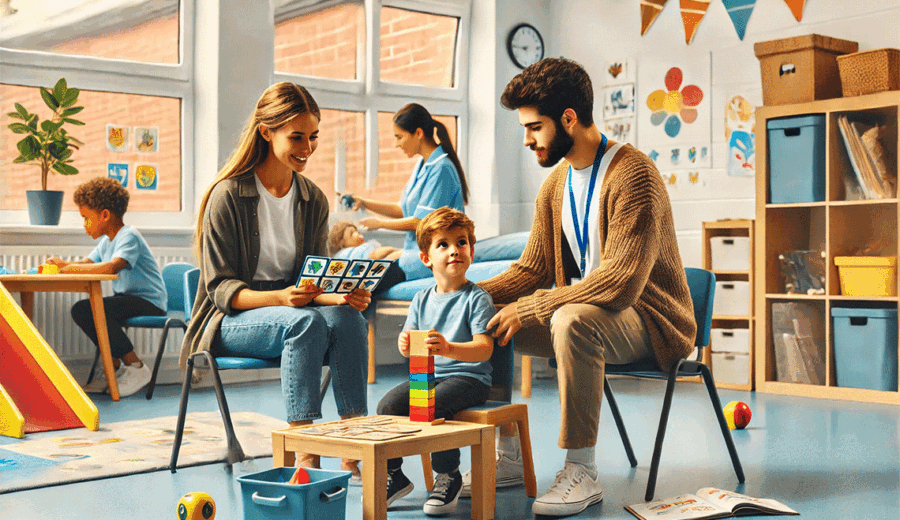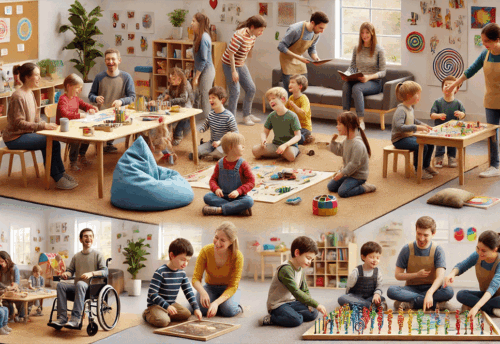
Therapies in the UK Education System
Accessing Speech, Occupational, and Behavioral Therapies in the UK Education System
The UK education system strives to support children with special educational needs and disabilities (SEND), including those requiring speech, occupational, and behavioral therapies. These therapies are critical in helping children overcome developmental challenges, improve communication, enhance motor skills, and navigate social or emotional difficulties. Understanding how to access these services is essential for parents, carers, and educators.
Speech Therapy in Schools
Speech and language therapy (SLT) helps children with speech delays, articulation issues, or social communication difficulties.
- How It Works: Speech therapists assess the child’s needs and develop tailored plans to improve communication. Techniques may include articulation exercises, vocabulary building, and non-verbal communication tools such as PECS (Picture Exchange Communication System).
- Accessing Services: Schools often collaborate with NHS-funded therapists or independent professionals. Children with complex needs may receive SLT through their Education, Health, and Care Plan (EHCP).
Occupational Therapy for Motor and Sensory Development
Occupational therapy (OT) supports children with fine and gross motor skill development, sensory processing, and daily life skills.
- How It Works: Therapists use activities like handwriting practice, balance exercises, and sensory play to build the child’s abilities. Interventions may include adaptive tools like pencil grips or weighted vests for sensory regulation.
- Accessing Services: OT services can be accessed through the NHS or private providers. Schools with SEND programs may offer on-site sessions or refer families to external specialists.
Behavioral Therapy for Emotional and Social Skills
Behavioral therapies, such as Applied Behavior Analysis (ABA) and Positive Behavior Support (PBS), are crucial for children struggling with emotional regulation or social interaction.
- How It Works: Therapists identify triggers and teach coping strategies through structured activities and reward systems. Goals may include reducing challenging behaviors, increasing social engagement, or fostering emotional resilience.
- Accessing Services: Schools may offer in-house behavioral specialists or connect families with external resources. An EHCP can also secure funding for tailored behavioral support.
The Role of Education, Health, and Care Plans (EHCPs)
EHCPs are essential for children with significant needs requiring additional support. They outline the therapies and accommodations a child is entitled to receive.
- How to Apply: Parents, carers, or schools can request an EHCP assessment from the local authority. The plan includes input from professionals like therapists, ensuring a holistic approach to the child’s development.
Challenges in Accessing Therapies
Despite available resources, families often face obstacles, including waiting lists, funding issues, and inconsistent availability of therapists. Advocating for your child’s needs and staying informed about rights under SEND laws can help overcome these barriers.
Collaboration Between Schools and Therapists
An integrated approach involving teachers, therapists, and parents ensures that therapies are seamlessly woven into the child’s daily life. Training teachers to use therapy techniques in classrooms further supports inclusive education.
The Importance of Early Intervention
Early access to speech, occupational, and behavioral therapies significantly improves outcomes. Timely support fosters a child’s ability to communicate, engage socially, and achieve academic success, empowering them to reach their full potential.
Accessing therapies within the UK education system requires persistence and collaboration, but the benefits for children and their families are profound. With the right support, children can overcome challenges, gain independence, and thrive in both academic and social settings.





Leave a Reply